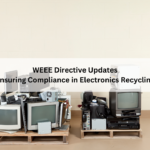If your business uses, produces or distributes electrical and electronic equipment, you are subject to certain environmental compliance rules. Firstly, you must be registered with a Waste Electrical and Electronic Equipment (WEEE) compliance scheme.
This is under the terms of WEEE legislation, set in a bid to encourage recycling and cut down on waste. For example, if your enterprise uses such products, you must store, collect, treat, recycle and dispose of WEEE separately from your other waste.
In addition, you must obtain and keep proof that such products were given to a waste management firm and were treated and disposed of in an eco-friendly manner. Meanwhile, if your business is involved in the importing or re-branding of such goods, you must mark your products with a crossed-out wheeled bin symbol and your unique producer identification sign.
In addition, under environmental compliance regulations, you must provide information to your compliance scheme every three months concerning the amount of equipment you place on the market.
Meanwhile, another aspect of WEEE compliance is that you have to make information available to operators of treatment and reprocessing facilities about new products you sell. The regulations are designed to help protect the environment by reducing waste and conserving resources.
By making sure your firm does its bit to help the planet, you will not only stay on the right side of the law, but you may also attract more customers – as people are becoming more conscious of the importance of ethical issues such as this. Our environmental compliance solutions can help to ensure that your company has green credentials.





